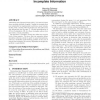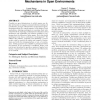278 search results - page 11 / 56 » Reasoning About General Games Described in GDL-II |
IJCAI
1989
13 years 8 months ago
1989
based on an abstract concept of quiescence. In the following we sketch this and a related model, describe the design of our experiments, and present the results of our simulation s...
ATAL
2010
Springer
13 years 8 months ago
2010
Springer
Alternating-time Temporal Logic (ATL) [1] is used to reason about strategic abilities of agents. Aiming at strategies that can realistically be implemented in software, many varia...
IGPL
2010
13 years 5 months ago
2010
Collective rationality in its ordinary sense is rationality’s extension to groups. It does not entail efficiency by definition. Showing that it entails efficiency requires a nor...
ACMICEC
2006
ACM
13 years 11 months ago
2006
ACM
Consider an open infrastructure in which anyone can deploy mechanisms to support automated decision making and coordination amongst self-interested computational agents. Strategyp...
AI
2006
Springer
13 years 11 months ago
2006
Springer
So far, most equilibrium concepts in game theory require that the rewards and actions of the other agents are known and/or observed by all agents. However, in real life problems, a...



